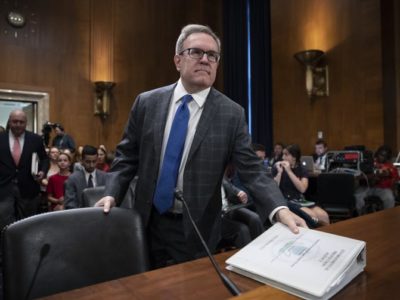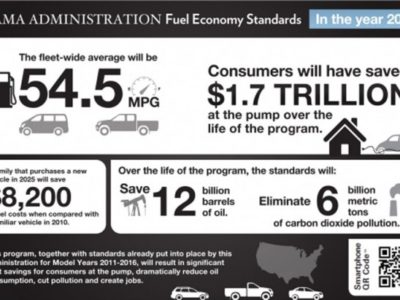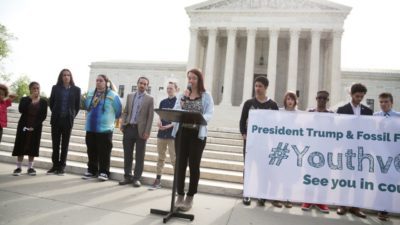Secretary Zinke Misleads the Public About Wildfires and Federal Public Land Management
Secretary of Interior's Op-Ed Ignores Science and Land-Use Planning to Falsely Blame Wildfire Risk on "Radical Environmentalists"
Interior Secretary Ryan Zinke published an op-ed today calling for "active management" of our federal public lands to reduce wildfire risk, and blaming "radical environmentalists who would rather see forests and communities burn than see a logger in the woods" for the prevalance and lethality of wildfires in the American West. Zinke's op-ed is disingenuous, meant to mislead readers about how our public lands are managed. His call for “active management” is a thin...
CONTINUE READINGDoes the Clean Air Act Mask One of Our Worst Remaining Air Pollution Problems?
New Article Addresses Hot Spot Pollution and the Clean Air Act
Over the last fifty years, we have made huge progress in cleaning up the nation's air. Overall pollution levels have dropped by 70 percent since the 1970s, cars are 99 percent cleaner, and we've essentially eliminated lead from the atmosphere. The Clean Air Act is the main reason for this success, saving countless lives and billions of dollars. The most stubbornly persistent remaining problem, though, is hot spot pollution: certain geographic areas that have air po...
CONTINUE READINGHow Would a Justice Kavanaugh Approach Environmental Cases?
Reflections From a Review of Kavanaugh's D.C. Circuit Opinions
As we await the outcome of President Trump’s nomination of Judge Kavanaugh to the Supreme Court, journalists and legal scholars have been scouring Judge Kavanaugh’s past decisions and legal writings for indications as to how he might resolve pressing legal questions if installed on the Court. I’m adding here a few thoughts to the many that have already been expressed on this score (including my colleague Ann Carlson’s), with a specific focus on Judge Kavanaugh�...
CONTINUE READINGWatered Down Standards at the TRUMP CAFÉ
Here are the FAQs about Trump's proposed rollback.
Trump is proposing to gut CO2 standards for cars, freezing 2020 CAFE fuel-efficiency standards in place for years to come. Without the freeze, the standards would automatically ramp up. He also wants to eliminate California’s ability to set its own standards, which many other states have opted to adopt. Here are seven key questions about Trump’s proposed rollback and some answers. Do the car companies really want this? A: Not so much. It's not that they lov...
CONTINUE READINGTrump administration and California are on collision course over vehicle emissions rules
Meredith Hankins and Nicholas Bryner co-author legal explainer for The Conversation
California and the Trump administration are going different directions on mileage standards. AP Photo/Rich Pedroncelli Meredith Hankins, University of California, Los Angeles and Nicholas Bryner, Louisiana State University The Trump administration on Aug. 2 formally announced a proposal to freeze fuel economy standards and tailpipe emission standards for new cars. In addition, it is proposing to revoke California’s authority to set more stringent rules. This m...
CONTINUE READINGThe Trump Administration Just Released Its Proposal to Eviscerate Car Standards, Revoke California Authority
The Legal Grounds For Doing So Are Dubious At Best
As expected, the Trump Administration has released its proposal that recommends freezing combined fuel efficiency and greenhouse gas standards at 2020 levels for model years 2021-2025. The proposal also recommends revoking the waiver EPA granted California in 2013 to issue its own greenhouse gas emissions standards and to continue the state's program to gradually increase the percentage of zero emissions vehicles each auto manufacturer must sell in the state. It is i...
CONTINUE READINGA Bipartisan Concern: National Security and Climate Change
Even within the Trump Administration and the House GOP, climate change is seen as a threat.
In written testimony to Congress about threat to national security, the Trump Administration's Director of National Intelligence (DNI) discussed climate change. His discussion didn't equivocate about the reality or dangers of climate change. Rather, he took the science, and the threat, seriously: "The past 115 years have been the warmest period in the history of modern civilization, and the past few years have been the warmest years on record. Extreme weather events...
CONTINUE READINGCareful what you wish for…
How Trump's efforts to rollback national monuments might backfire
We have posted repeatedly here on Legal Planet on the Trump Administration’s efforts to rollback national monument designations made by prior administrations. Litigation over those efforts is still ongoing (and likely will be for a long time). However, I want to note some of the implications if the Administration should succeed in convincing the courts that it does indeed have the power to rollback monument designations (along the lines of the arguments made by Joh...
CONTINUE READINGPublic Lands Watch: ESA Regulations
Administration proposes subsantial revisions to the regulations that implement the Endangered Species Act
One of the most important statutes for management of federal public lands is the Endangered Species Act (ESA). It’s important because it requires all federal agencies to avoid jeopardizing the existence of listed endangered and threatened species through their actions, and also to avoid adversely modifying critical habitat for those species. That means when the Forest Service builds a road or conducts a timber sale (for instance), it has to follow procedures under ...
CONTINUE READINGAwaiting the Climate Change “Trial of the Century”
Juliana v. U.S. "Atmospheric Trust" Federal Trial Set to Begin in October
The Trump Administration really, really doesn't want the Juliana v. United States case, a.k.a. the "atmospheric trust litigation," to go to trial. But despite the persistent efforts of President Trump's Justice Department to have the Juliana case dismissed, it now appears that the most important currently-pending climate change case in the nation will indeed go to trial before a federal district judge in Oregon this October. I profiled the Juliana case on this si...
CONTINUE READING









